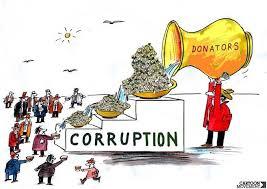Focus on Africa-Scapegoating in Failed Governments particularly Nigeria. By Hugo Keji

Scapegoating is a common phenomenon in failed governments. It involves blaming a person or group for problems and failures, diverting attention from the actual causes and the accountability of those in power.
Below is an outline for an article that explores this topic in detail.
Section 1: Introduction
Scapegoating is a practice where a person or group is unfairly blamed for problems, often to deflect attention from the true causes and protect those responsible. In the context of failed governments, scapegoating becomes a powerful tool to maintain control and shift public frustration away from leadership. These governments, facing significant internal and external challenges, resort to identifying convenient targets to channel the anger and dissatisfaction of the populace. This article explores the phenomenon of scapegoating in failed governments, examining its mechanisms, impacts, and historical and modern examples.
Section 2: Historical Context
Throughout history, failed governments have frequently used scapegoating to survive political crises. In ancient Rome, emperors would blame Christians or foreign groups for societal problems to divert attention from their own failures. Similarly, during the decline of the Ottoman Empire, minority groups like Armenians and Greeks were often scapegoated for economic and political issues. These historical examples highlight a recurring pattern where those in power deflect blame onto vulnerable or marginalized groups, reinforcing their authority while deepening societal divisions.
Section 3: Mechanisms of Scapegoating
Scapegoating in failed governments involves several mechanisms:
-
Identification of Scapegoats: Leaders choose individuals or groups that are distinct and can be easily marginalized, such as ethnic minorities, political opponents, or religious communities.
-
Propaganda and Media Manipulation: Governments use state-controlled media to spread false narratives and exaggerate the threat posed by scapegoats, creating a common enemy for the public.
-
Leadership and Rhetoric: Political leaders employ inflammatory rhetoric to incite fear and anger, positioning themselves as protectors against the supposed threat.
By understanding these mechanisms, we can see how failed governments manipulate public perception and maintain control despite their shortcomings.
AfriPrime App link: FREE to download...
https://www.amazon.com/Africircle-AfriPrime/dp/B0D2M3F2JT
Section 4: Impact on Society
Scapegoating has profound impacts on society:
-
Social Divisions and Unrest: Targeting specific groups exacerbates existing tensions, leading to increased social conflict and violence.
-
Erosion of Trust in Institutions: When governments use scapegoating to distract from their failures, public trust in institutions diminishes, weakening the overall social fabric.
-
Long-term Consequences: The divisions and mistrust sown by scapegoating can persist long after the regime has fallen, hindering national reconciliation and recovery.
These impacts demonstrate the destructive power of scapegoating, highlighting the need for accountability and transparent governance.
Section 5: Case Studies
Examining specific case studies provides deeper insight into the practice of scapegoating in failed governments:
-
Nazi Germany: Adolf Hitler and the Nazi regime blamed Jews for Germany's economic woes and societal problems, leading to the Holocaust and World War II.
-
Rwanda: The Rwandan government, facing internal strife, scapegoated the Tutsi minority, culminating in the 1994 genocide.
-
Venezuela: In recent years, the Venezuelan government has blamed external actors and internal political opponents for the country's economic collapse, exacerbating political and social turmoil.
Analyzing these cases reveals common tactics and outcomes, illustrating the devastating effects of scapegoating on national and international levels.
Section 6: Psychological and Sociological Perspectives
Understanding why societies and leaders resort to scapegoating requires examining psychological and sociological factors:
-
Psychological Mechanisms: Leaders use scapegoating to consolidate power and deflect responsibility, exploiting human tendencies towards in-group/out-group biases.
-
Sociological Dynamics: Societies under stress are more susceptible to scapegoating, as individuals seek simple explanations for complex problems and rally against perceived threats.
These perspectives help explain the persistence and potency of scapegoating, offering insights into preventing its recurrence.
Section 7: Modern Examples and Implications
In contemporary times, we see instances of scapegoating in failing states like:
-
Myanmar: The Rohingya crisis, where the government blamed the Rohingya Muslims for national security issues, leading to widespread violence and displacement.
-
Syria: The Assad regime has often blamed foreign conspiracies and internal dissidents for the ongoing civil war, deflecting from its own role in the conflict.
These modern examples underscore the ongoing relevance of scapegoating in global politics, emphasizing the need for international vigilance and intervention.
Section 8: Conclusion
Scapegoating in failed governments is a destructive practice with deep historical roots and significant contemporary implications. By understanding the mechanisms, impacts, and examples of scapegoating, we can better recognize and counteract this tactic. Effective governance requires accountability, transparency, and inclusivity, ensuring that blame is accurately assigned and societal divisions are healed. As global citizens, it is our responsibility to advocate for these principles, fostering a world where scapegoating is replaced by genuine problem-solving and reconciliation.
AfriPrime App link: FREE to download...
- Questions and Answers
- Opinion
- Motivational and Inspiring Story
- Technology
- Live and Let live
- Focus
- Geopolitics
- Military-Arms/Equipment
- Segurança
- Economy
- Beasts of Nations
- Machine Tools-The “Mother Industry”
- Art
- Causes
- Crafts
- Dance
- Drinks
- Film/Movie
- Fitness
- Food
- Jogos
- Gardening
- Health
- Início
- Literature
- Music
- Networking
- Outro
- Party
- Religion
- Shopping
- Sports
- Theater
- Health and Wellness
- News
- Culture

